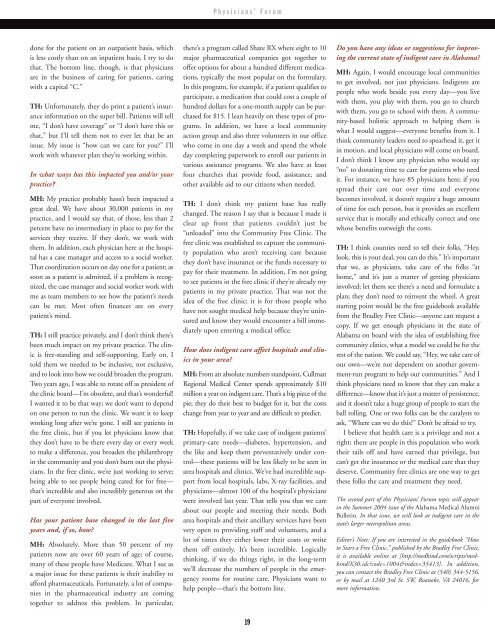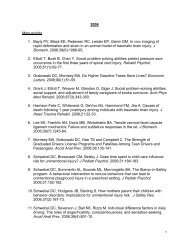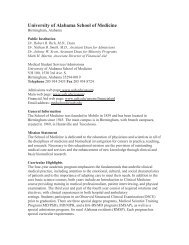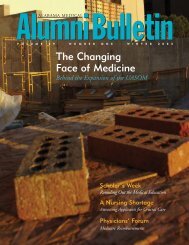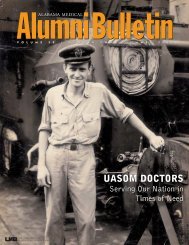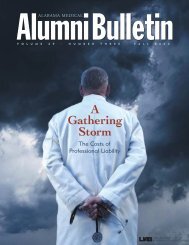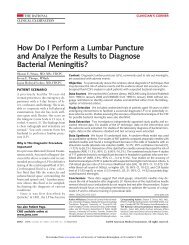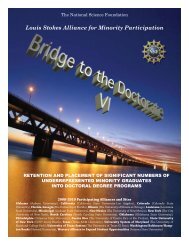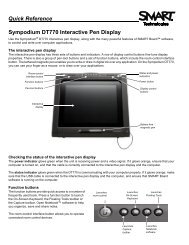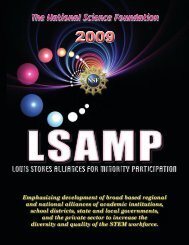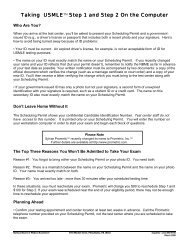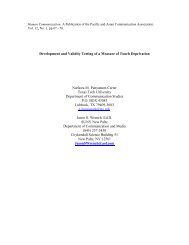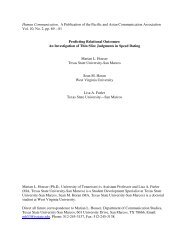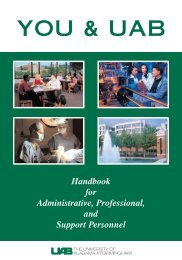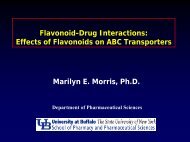the pursuit of parkinson's - The University of Alabama at Birmingham
the pursuit of parkinson's - The University of Alabama at Birmingham
the pursuit of parkinson's - The University of Alabama at Birmingham
You also want an ePaper? Increase the reach of your titles
YUMPU automatically turns print PDFs into web optimized ePapers that Google loves.
Physicians’ Forum<br />
done for <strong>the</strong> p<strong>at</strong>ient on an outp<strong>at</strong>ient basis, which<br />
is less costly than on an inp<strong>at</strong>ient basis, I try to do<br />
th<strong>at</strong>. <strong>The</strong> bottom line, though, is th<strong>at</strong> physicians<br />
are in <strong>the</strong> business <strong>of</strong> caring for p<strong>at</strong>ients, caring<br />
with a capital “C.”<br />
TH: Unfortun<strong>at</strong>ely, <strong>the</strong>y do print a p<strong>at</strong>ient’s insurance<br />
inform<strong>at</strong>ion on <strong>the</strong> super bill. P<strong>at</strong>ients will tell<br />
me, “I don’t have coverage” or “I don’t have this or<br />
th<strong>at</strong>,” but I’ll tell <strong>the</strong>m not to ever let th<strong>at</strong> be an<br />
issue. My issue is “how can we care for you?” I’ll<br />
work with wh<strong>at</strong>ever plan <strong>the</strong>y’re working within.<br />
In wh<strong>at</strong> ways has this impacted you and/or your<br />
practice?<br />
MH: My practice probably hasn’t been impacted a<br />
gre<strong>at</strong> deal. We have about 30,000 p<strong>at</strong>ients in my<br />
practice, and I would say th<strong>at</strong>, <strong>of</strong> those, less than 2<br />
percent have no intermediary in place to pay for <strong>the</strong><br />
services <strong>the</strong>y receive. If <strong>the</strong>y don’t, we work with<br />
<strong>the</strong>m. In addition, each physician here <strong>at</strong> <strong>the</strong> hospital<br />
has a case manager and access to a social worker.<br />
Th<strong>at</strong> coordin<strong>at</strong>ion occurs on day one for a p<strong>at</strong>ient; as<br />
soon as a p<strong>at</strong>ient is admitted, if a problem is recognized,<br />
<strong>the</strong> case manager and social worker work with<br />
me as team members to see how <strong>the</strong> p<strong>at</strong>ient’s needs<br />
can be met. Most <strong>of</strong>ten finances are on every<br />
p<strong>at</strong>ient’s mind.<br />
TH: I still practice priv<strong>at</strong>ely, and I don’t think <strong>the</strong>re’s<br />
been much impact on my priv<strong>at</strong>e practice. <strong>The</strong> clinic<br />
is free-standing and self-supporting. Early on, I<br />
told <strong>the</strong>m we needed to be inclusive, not exclusive,<br />
and to look into how we could broaden <strong>the</strong> program.<br />
Two years ago, I was able to rot<strong>at</strong>e <strong>of</strong>f as president <strong>of</strong><br />
<strong>the</strong> clinic board—I’m obsolete, and th<strong>at</strong>’s wonderful!<br />
I wanted it to be th<strong>at</strong> way; we don’t want to depend<br />
on one person to run <strong>the</strong> clinic. We want it to keep<br />
working long after we’re gone. I still see p<strong>at</strong>ients in<br />
<strong>the</strong> free clinic, but if you let physicians know th<strong>at</strong><br />
<strong>the</strong>y don’t have to be <strong>the</strong>re every day or every week<br />
to make a difference, you broaden <strong>the</strong> philanthropy<br />
in <strong>the</strong> community and you don’t burn out <strong>the</strong> physicians.<br />
In <strong>the</strong> free clinic, we’re just working to serve;<br />
being able to see people being cared for for free—<br />
th<strong>at</strong>’s incredible and also incredibly generous on <strong>the</strong><br />
part <strong>of</strong> everyone involved.<br />
Has your p<strong>at</strong>ient base changed in <strong>the</strong> last five<br />
years and, if so, how?<br />
MH: Absolutely. More than 50 percent <strong>of</strong> my<br />
p<strong>at</strong>ients now are over 60 years <strong>of</strong> age; <strong>of</strong> course,<br />
many <strong>of</strong> <strong>the</strong>se people have Medicare. Wh<strong>at</strong> I see as<br />
a major issue for <strong>the</strong>se p<strong>at</strong>ients is <strong>the</strong>ir inability to<br />
afford pharmaceuticals. Fortun<strong>at</strong>ely, a lot <strong>of</strong> companies<br />
in <strong>the</strong> pharmaceutical industry are coming<br />
toge<strong>the</strong>r to address this problem. In particular,<br />
<strong>the</strong>re’s a program called Share RX where eight to 10<br />
major pharmaceutical companies got toge<strong>the</strong>r to<br />
<strong>of</strong>fer options for about a hundred different medic<strong>at</strong>ions,<br />
typically <strong>the</strong> most popular on <strong>the</strong> formulary.<br />
In this program, for example, if a p<strong>at</strong>ient qualifies to<br />
particip<strong>at</strong>e, a medic<strong>at</strong>ion th<strong>at</strong> could cost a couple <strong>of</strong><br />
hundred dollars for a one-month supply can be purchased<br />
for $15. I lean heavily on <strong>the</strong>se types <strong>of</strong> programs.<br />
In addition, we have a local community<br />
action group and also three volunteers in our <strong>of</strong>fice<br />
who come in one day a week and spend <strong>the</strong> whole<br />
day completing paperwork to enroll our p<strong>at</strong>ients in<br />
various assistance programs. We also have <strong>at</strong> least<br />
four churches th<strong>at</strong> provide food, assistance, and<br />
o<strong>the</strong>r available aid to our citizens when needed.<br />
TH: I don’t think my p<strong>at</strong>ient base has really<br />
changed. <strong>The</strong> reason I say th<strong>at</strong> is because I made it<br />
clear up front th<strong>at</strong> p<strong>at</strong>ients couldn’t just be<br />
“unloaded” into <strong>the</strong> Community Free Clinic. <strong>The</strong><br />
free clinic was established to capture <strong>the</strong> community<br />
popul<strong>at</strong>ion who aren’t receiving care because<br />
<strong>the</strong>y don’t have insurance or <strong>the</strong> funds necessary to<br />
pay for <strong>the</strong>ir tre<strong>at</strong>ment. In addition, I’m not going<br />
to see p<strong>at</strong>ients in <strong>the</strong> free clinic if <strong>the</strong>y’re already my<br />
p<strong>at</strong>ients in my priv<strong>at</strong>e practice. Th<strong>at</strong> was not <strong>the</strong><br />
idea <strong>of</strong> <strong>the</strong> free clinic; it is for those people who<br />
have not sought medical help because <strong>the</strong>y’re uninsured<br />
and know <strong>the</strong>y would encounter a bill immedi<strong>at</strong>ely<br />
upon entering a medical <strong>of</strong>fice.<br />
How does indigent care affect hospitals and clinics<br />
in your area?<br />
MH: From an absolute numbers standpoint, Cullman<br />
Regional Medical Center spends approxim<strong>at</strong>ely $10<br />
million a year on indigent care. Th<strong>at</strong>’s a big piece <strong>of</strong> <strong>the</strong><br />
pie; <strong>the</strong>y do <strong>the</strong>ir best to budget for it, but <strong>the</strong> costs<br />
change from year to year and are difficult to predict.<br />
TH: Hopefully, if we take care <strong>of</strong> indigent p<strong>at</strong>ients’<br />
primary-care needs—diabetes, hypertension, and<br />
<strong>the</strong> like and keep <strong>the</strong>m prevent<strong>at</strong>ively under control—<strong>the</strong>se<br />
p<strong>at</strong>ients will be less likely to be seen in<br />
area hospitals and clinics. We’ve had incredible support<br />
from local hospitals, labs, X-ray facilities, and<br />
physicians—almost 100 <strong>of</strong> <strong>the</strong> hospital’s physicians<br />
were involved last year. Th<strong>at</strong> tells you th<strong>at</strong> we care<br />
about our people and meeting <strong>the</strong>ir needs. Both<br />
area hospitals and <strong>the</strong>ir ancillary services have been<br />
very open to providing staff and volunteers, and a<br />
lot <strong>of</strong> times <strong>the</strong>y ei<strong>the</strong>r lower <strong>the</strong>ir costs or write<br />
<strong>the</strong>m <strong>of</strong>f entirely. It’s been incredible. Logically<br />
thinking, if we do things right, in <strong>the</strong> long-term<br />
we’ll decrease <strong>the</strong> numbers <strong>of</strong> people in <strong>the</strong> emergency<br />
rooms for routine care. Physicians want to<br />
help people—th<strong>at</strong>’s <strong>the</strong> bottom line.<br />
19<br />
Do you have any ideas or suggestions for improving<br />
<strong>the</strong> current st<strong>at</strong>e <strong>of</strong> indigent care in <strong>Alabama</strong>?<br />
MH: Again, I would encourage local communities<br />
to get involved, not just physicians. Indigents are<br />
people who work beside you every day—you live<br />
with <strong>the</strong>m, you play with <strong>the</strong>m, you go to church<br />
with <strong>the</strong>m, you go to school with <strong>the</strong>m. A community-based<br />
holistic approach to helping <strong>the</strong>m is<br />
wh<strong>at</strong> I would suggest—everyone benefits from it. I<br />
think community leaders need to spearhead it, get it<br />
in motion, and local physicians will come on board.<br />
I don’t think I know any physician who would say<br />
“no” to don<strong>at</strong>ing time to care for p<strong>at</strong>ients who need<br />
it. For instance, we have 85 physicians here; if you<br />
spread <strong>the</strong>ir care out over time and everyone<br />
becomes involved, it doesn’t require a huge amount<br />
<strong>of</strong> time for each person, but it provides an excellent<br />
service th<strong>at</strong> is morally and ethically correct and one<br />
whose benefits outweigh <strong>the</strong> costs.<br />
TH: I think counties need to tell <strong>the</strong>ir folks, “Hey,<br />
look, this is your deal, you can do this.” It’s important<br />
th<strong>at</strong> we, as physicians, take care <strong>of</strong> <strong>the</strong> folks “<strong>at</strong><br />
home,” and it’s just a m<strong>at</strong>ter <strong>of</strong> getting physicians<br />
involved; let <strong>the</strong>m see <strong>the</strong>re’s a need and formul<strong>at</strong>e a<br />
plan; <strong>the</strong>y don’t need to reinvent <strong>the</strong> wheel. A gre<strong>at</strong><br />
starting point would be <strong>the</strong> free guidebook available<br />
from <strong>the</strong> Bradley Free Clinic—anyone can request a<br />
copy. If we get enough physicians in <strong>the</strong> st<strong>at</strong>e <strong>of</strong><br />
<strong>Alabama</strong> on board with <strong>the</strong> idea <strong>of</strong> establishing free<br />
community clinics, wh<strong>at</strong> a model we could be for <strong>the</strong><br />
rest <strong>of</strong> <strong>the</strong> n<strong>at</strong>ion. We could say, “Hey, we take care <strong>of</strong><br />
our own—we’re not dependent on ano<strong>the</strong>r government-run<br />
program to help our communities.” And I<br />
think physicians need to know th<strong>at</strong> <strong>the</strong>y can make a<br />
difference—know th<strong>at</strong> it’s just a m<strong>at</strong>ter <strong>of</strong> persistence,<br />
and it doesn’t take a huge group <strong>of</strong> people to start <strong>the</strong><br />
ball rolling. One or two folks can be <strong>the</strong> c<strong>at</strong>alysts to<br />
ask, “Where can we do this?” Don’t be afraid to try.<br />
I believe th<strong>at</strong> health care is a privilege and not a<br />
right; <strong>the</strong>re are people in this popul<strong>at</strong>ion who work<br />
<strong>the</strong>ir tails <strong>of</strong>f and have earned th<strong>at</strong> privilege, but<br />
can’t get <strong>the</strong> insurance or <strong>the</strong> medical care th<strong>at</strong> <strong>the</strong>y<br />
deserve. Community free clinics are one way to get<br />
<strong>the</strong>se folks <strong>the</strong> care and tre<strong>at</strong>ment <strong>the</strong>y need.<br />
<strong>The</strong> second part <strong>of</strong> this Physicians’ Forum topic will appear<br />
in <strong>the</strong> Summer 2004 issue <strong>of</strong> <strong>the</strong> <strong>Alabama</strong> Medical Alumni<br />
Bulletin. In th<strong>at</strong> issue, we will look <strong>at</strong> indigent care in <strong>the</strong><br />
st<strong>at</strong>e’s larger metropolitan areas.<br />
Editor’s Note: If you are interested in <strong>the</strong> guidebook “How<br />
to Start a Free Clinic,” published by <strong>the</strong> Bradley Free Clinic,<br />
it is available online <strong>at</strong> [http://medkind.com/scripts/medkind/X30.idc?code=1004&index=35413].<br />
In addition,<br />
you can contact <strong>the</strong> Bradley Free Clinic <strong>at</strong> (540) 344-5156,<br />
or by mail <strong>at</strong> 1240 3rd St. SW, Roanoke, VA 24016, for<br />
more inform<strong>at</strong>ion.


